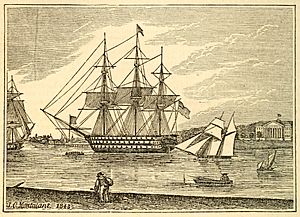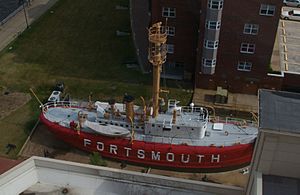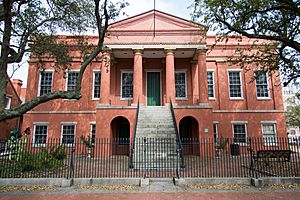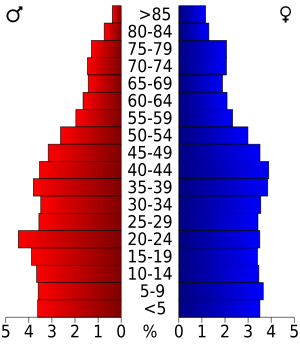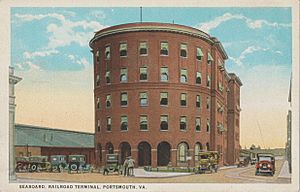Portsmouth, Virginia facts for kids
Quick facts for kids
Portsmouth, Virginia
|
||
|---|---|---|
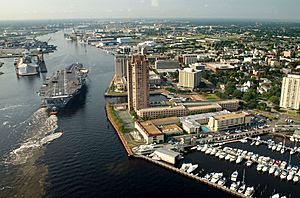
Downtown Portsmouth on the Elizabeth River
|
||
|
||
| Country | United States | |
| State | Virginia | |
| County | None (Independent city) | |
| Founded | 1752 | |
| Named for | Portsmouth, England | |
| Government | ||
| • Type | Mayor–council–manager | |
| Area | ||
| • Total | 46.68 sq mi (120.91 km2) | |
| • Land | 33.30 sq mi (86.25 km2) | |
| • Water | 13.38 sq mi (34.66 km2) | |
| Elevation | 20 ft (6 m) | |
| Population
(2020)
|
||
| • Total | 97,840 | |
| • Rank | 9th in Virginia | |
| • Density | 2,940.39/sq mi (1,135.29/km2) | |
| Time zone | UTC−5 (EST) | |
| • Summer (DST) | UTC−4 (EDT) | |
| ZIP Codes |
23701-23709
|
|
| Area code(s) | 757, 948 | |
| FIPS code | 51-64000 | |
| GNIS feature ID | 1497102 | |
| Website | www.portsmouthva.gov | |
Portsmouth is a city in southeastern Virginia, United States. It is an independent city, meaning it is not part of any county. Portsmouth is located across the Elizabeth River from Norfolk.
In 2020, about 97,915 people lived in Portsmouth. This makes it the ninth-largest city in Virginia. It is part of the larger Hampton Roads area. The Norfolk Naval Shipyard, a very old and active U.S. Navy base, is found in Portsmouth.
Contents
History of Portsmouth, Virginia

In 1620, a shipbuilder named John Wood saw that the area where Portsmouth now stands would be a good place to build ships. He asked King James I of England for land there. Soon, the land around it became a farming community.
Portsmouth was officially started as a town in 1752. It was founded by Colonel William Crawford, who was a member of the Virginia government. The town was named after Portsmouth, England.
In 1767, another shipbuilder, Andrew Sprowle, started the Gosport Shipyard next to Portsmouth. After the American Revolutionary War, the shipyard was sold to the new United States government.
In 1855, a serious yellow fever sickness spread through Portsmouth and Norfolk. It sadly killed one out of every three people in the area. In 1858, Portsmouth became an independent city, separate from Norfolk County.
Portsmouth During the Civil War
During the American Civil War in 1861, Virginia joined the Confederate States of America. The commander of the shipyard in Portsmouth ordered it to be burned. This was to stop the Confederacy from taking control. However, Confederate forces did take over the shipyard without a fight. This happened because of a clever trick by railroad builder William Mahone.
The Union forces moved to Fort Monroe, which was the only place in the area they still controlled. In early 1862, the Confederate ironclad warship CSS Virginia was built using parts of the burned USS Merrimack. The Virginia fought the Union ironclad USS Monitor in the famous Battle of Hampton Roads. This battle happened during the Union's blockade of Hampton Roads. When the Confederates left in May 1862, they burned the shipyard again.
After Union forces took back Norfolk and Portsmouth, the shipyard's name was changed to Norfolk Naval Shipyard. This name came from its location in Norfolk County. Today, the Norfolk Naval Shipyard is completely inside Portsmouth. The name was kept to avoid confusion with the Portsmouth Naval Shipyard in Kittery, Maine.
Modern Portsmouth Developments
During and after World War II, the shipyard grew a lot. New neighborhoods were built around Norfolk and Portsmouth. Portsmouth remained the main town for Norfolk County until 1963. That year, the new city of Chesapeake was formed by combining with the city of South Norfolk. Another neighbor, Nansemond County, also combined with a smaller city to form the new city of Suffolk in 1974.
In the early 2000s, Portsmouth started to improve its downtown area. In 2007, a large shipping terminal for container ships, called APM "MAERSK", opened in the West Norfolk area.
Timeline of Key Events
- 1752 – Portsmouth was founded by William Crawford. It was named after Portsmouth, England.
- 1779 – British forces attacked Portsmouth during the American Revolutionary War.
- 1812 – The Dismal Swamp Canal opened.
- 1836 – Portsmouth officially became a town.
- 1855 – A yellow fever outbreak occurred.
- 1858 – Portsmouth became an independent city.
- 1861 – The shipyard was burned by Union forces.
- 1862 – The Battle of Hampton Roads took place.
- 1949 – The Portsmouth Naval Shipyard Museum was started.
- 1952 – The Downtown Tunnel opened.
- 1960 – The population reached 114,773.
- 1963 – Portsmouth gained more land from Norfolk County.
- 2023 – Rivers Casino Portsmouth, Virginia's first permanent casino, opened.
Historic Places to Visit
Olde Towne Historic District
The Olde Towne Historic District has many old and important homes. It is one of the largest collections of historic houses between Alexandria, Virginia and Charleston, South Carolina. The Emanuel African Methodist Episcopal Church was built by enslaved and free people. It is the second-oldest building in Portsmouth and the city's oldest Black church.
Other historic buildings include the Pass House, built in 1841. Union soldiers used it from 1862 to 1865. People needed a special pass from this house to travel across the Elizabeth River.
The Naval Medical Center Portsmouth is a U.S. Navy hospital next to the Olde Towne Historic District. It was founded in 1827. It is the oldest hospital that has been open continuously in the Navy's medical system. Its motto is "First and Finest."
Seaboard Coastline Building
This historic building at 1 High Street was once a train station. It was also the main office for the Seaboard Air Line railroad company.
The Hill House
The Hill House is a four-story home built in 1825. It is special because it is still filled with the original belongings of the Hill family. These items show that the family collected many things and lived well for 150 years. The house has not been changed much over the years.
Cedar Grove Cemetery
Cedar Grove Cemetery was started in 1832. It is the oldest cemetery owned by the city of Portsmouth. It is known for its beautiful funerary art (grave markers and statues). Many important leaders from the city's past are buried here. You can take a self-guided tour using historical markers.
Geography and Climate
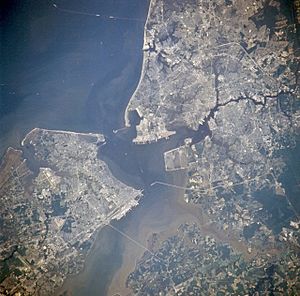
Portsmouth covers about 47 square miles (122 square kilometers). About 34 square miles (88 square kilometers) is land, and 13 square miles (34 square kilometers) is water. The city is divided by the West Branch of the Elizabeth River. This river flows from nearby Suffolk.
Portsmouth's Climate
Portsmouth has a humid subtropical climate. This means summers are hot and humid, with warm evenings. The average temperature each year is about 65°F (18°C). The city gets about 3 inches (7.6 cm) of snow and 47 inches (119 cm) of rain each year. Spring and summer are the wettest seasons, but it rains fairly steadily all year.
The highest temperature ever recorded was 105°F (41°C) in 1980. The lowest was -3°F (-19°C) in 1985. Portsmouth is usually safe from major storms like hurricanes. This is because it is south of where most northern storms form and north of where most tropical storms travel. Snow does not fall very often.
| Climate data for Norfolk International Airport, Virginia (1981–2010 normals, extremes 1874–present ) | |||||||||||||
|---|---|---|---|---|---|---|---|---|---|---|---|---|---|
| Month | Jan | Feb | Mar | Apr | May | Jun | Jul | Aug | Sep | Oct | Nov | Dec | Year |
| Record high °F (°C) | 84 (29) |
82 (28) |
92 (33) |
97 (36) |
100 (38) |
102 (39) |
105 (41) |
105 (41) |
100 (38) |
95 (35) |
86 (30) |
82 (28) |
105 (41) |
| Mean maximum °F (°C) | 71.1 (21.7) |
73.2 (22.9) |
80.2 (26.8) |
86.4 (30.2) |
91.4 (33.0) |
95.5 (35.3) |
97.8 (36.6) |
95.8 (35.4) |
92.1 (33.4) |
85.6 (29.8) |
78.7 (25.9) |
72.5 (22.5) |
98.8 (37.1) |
| Mean daily maximum °F (°C) | 48.1 (8.9) |
50.9 (10.5) |
58.2 (14.6) |
67.6 (19.8) |
75.4 (24.1) |
83.5 (28.6) |
87.4 (30.8) |
85.1 (29.5) |
79.3 (26.3) |
70.1 (21.2) |
61.1 (16.2) |
52.1 (11.2) |
68.3 (20.2) |
| Mean daily minimum °F (°C) | 32.7 (0.4) |
34.4 (1.3) |
40.5 (4.7) |
48.9 (9.4) |
57.9 (14.4) |
67.1 (19.5) |
71.9 (22.2) |
70.7 (21.5) |
65.3 (18.5) |
54.0 (12.2) |
44.6 (7.0) |
36.1 (2.3) |
52.1 (11.2) |
| Mean minimum °F (°C) | 17.6 (−8.0) |
21.2 (−6.0) |
27.2 (−2.7) |
35.7 (2.1) |
45.7 (7.6) |
55.5 (13.1) |
63.1 (17.3) |
61.6 (16.4) |
53.7 (12.1) |
39.7 (4.3) |
30.5 (−0.8) |
21.7 (−5.7) |
15.2 (−9.3) |
| Record low °F (°C) | −3 (−19) |
2 (−17) |
14 (−10) |
23 (−5) |
36 (2) |
45 (7) |
54 (12) |
49 (9) |
40 (4) |
27 (−3) |
17 (−8) |
5 (−15) |
−3 (−19) |
| Average precipitation inches (mm) | 3.40 (86) |
3.12 (79) |
3.68 (93) |
3.41 (87) |
3.41 (87) |
4.26 (108) |
5.14 (131) |
5.52 (140) |
4.76 (121) |
3.42 (87) |
3.15 (80) |
3.26 (83) |
46.53 (1,182) |
| Average snowfall inches (cm) | 2.4 (6.1) |
2.0 (5.1) |
0.2 (0.51) |
trace | 0 (0) |
0 (0) |
0 (0) |
0 (0) |
0 (0) |
0 (0) |
trace | 1.2 (3.0) |
5.8 (15) |
| Average precipitation days (≥ 0.01 in) | 10.4 | 9.5 | 10.6 | 10.1 | 10.6 | 9.9 | 11.1 | 10.1 | 8.8 | 7.6 | 8.5 | 9.8 | 117.0 |
| Average snowy days (≥ 0.1 in) | 1.6 | 1.3 | 0.4 | 0.1 | 0 | 0 | 0 | 0 | 0 | 0 | 0 | 0.6 | 4.0 |
| Average relative humidity (%) | 66.3 | 65.6 | 64.6 | 62.8 | 68.8 | 70.6 | 73.3 | 75.2 | 74.4 | 72.1 | 68.5 | 67.0 | 69.1 |
| Mean monthly sunshine hours | 171.5 | 175.2 | 229.3 | 252.8 | 271.7 | 280.1 | 278.3 | 260.4 | 231.4 | 208.3 | 175.7 | 160.4 | 2,695.1 |
| Percent possible sunshine | 56 | 58 | 62 | 64 | 62 | 64 | 62 | 62 | 62 | 60 | 57 | 53 | 61 |
| Source: NOAA (relative humidity and sun 1961–1990) | |||||||||||||
Population and People
| Historical population | |||
|---|---|---|---|
| Census | Pop. | %± | |
| 1840 | 6,477 | — | |
| 1850 | 8,626 | 33.2% | |
| 1860 | 9,496 | 10.1% | |
| 1870 | 10,590 | 11.5% | |
| 1880 | 11,390 | 7.6% | |
| 1890 | 13,268 | 16.5% | |
| 1900 | 17,427 | 31.3% | |
| 1910 | 33,190 | 90.5% | |
| 1920 | 54,387 | 63.9% | |
| 1930 | 45,704 | −16.0% | |
| 1940 | 50,745 | 11.0% | |
| 1950 | 80,039 | 57.7% | |
| 1960 | 114,773 | 43.4% | |
| 1970 | 110,963 | −3.3% | |
| 1980 | 104,577 | −5.8% | |
| 1990 | 103,910 | −0.6% | |
| 2000 | 100,565 | −3.2% | |
| 2010 | 95,535 | −5.0% | |
| 2020 | 97,915 | 2.5% | |
| U.S. Decennial Census 1790–1960 1900–1990 1990–2000 2010–2013 |
|||
Who Lives in Portsmouth?
According to the 2020 census, Portsmouth had 97,915 people. The city is home to a diverse population. About 52.68% of the people were Black or African American. About 35.66% were White. Other groups included Asian, Native American, and Pacific Islander people. About 4.51% of the population was Hispanic or Latino.
In 2010, there were 38,170 households in Portsmouth. About 30.6% of these households had children under 18. The average household had 2.51 people. The average family had 3.05 people.
The median age in the city was 34 years old. This means half the people were older than 34 and half were younger. About 25.7% of the population was under 18. About 13.8% were 65 or older.
The median income for a household in Portsmouth was $46,340. For families, it was $53,769. About 16.7% of the total population lived below the poverty line. This included 27.1% of those under 18.
Fun Things to Do in Portsmouth
Tourism and Attractions
Portsmouth has always been an important port town. The Olde Towne Business and Historical District in downtown is being preserved and improved. For example, the Hawthorn Hotel & Suites at The Governor Dinwiddie Hotel was renovated and reopened in 2005. It is recognized by Historic Hotels of America for keeping its historical look. The hotel is named after Robert Dinwiddie, who was the governor when Portsmouth was founded in 1752.
Other interesting places to visit include the Portsmouth City Park. This park has a small narrow gauge train called the Portsmouth City Railroad. It runs a Chance Rides C.P. Huntington locomotive named Pokey Smokey II.
The Railroad Museum of Virginia is located at Harbor Center Way. It has old railroad items, train cars, and a working model train layout.
Opened in 2023, the Rivers Casino Portsmouth has a large casino floor with many games.
Sports in Portsmouth
Portsmouth has a history with sports. The Portsmouth Cavaliers were a basketball team that played in 2011–12. They played their home games at the Chick-fil-A Fieldhouse.
Every April since 1953, Portsmouth hosts the Portsmouth Invitational Tournament. This event brings college basketball players to play in front of scouts from the NBA and top European leagues. Many famous basketball stars, like Jimmy Butler and Scottie Pippen, played in this tournament before becoming pros.
Schools and Learning
Schools for Kids and Teens
Portsmouth Public Schools runs the public schools in the city. There are three public high schools in Portsmouth:
- Churchland High School in the northwest.
- I.C. Norcom High School in downtown.
- Manor High School in the southwest.
Colleges and Universities
Portsmouth also has places for higher education. The Tri-Cities Higher Education Center of Old Dominion University (ODU) is located here. ODU is a public research university whose main campus is in Norfolk.
The Fred W. Beazley Portsmouth Campus of Tidewater Community College is also in Portsmouth. This college offers two-year programs. Angelos Bible College was started in 1984.
Media and News
Portsmouth's daily newspaper is the Virginian-Pilot. The New Journal and Guide and Inside Business are other local papers. Hampton Roads Magazine is a regional magazine published every two months. The Hampton Roads Times is an online magazine for the area.
Many radio stations serve Portsmouth. The city is also served by several TV stations. The main network channels include WTKR-TV (CBS), WAVY (NBC), and WVEC-TV (ABC). Cable TV is provided by Cox Cable and Verizon FIOS. Satellite TV options like DirecTV and Dish Network are also popular.
Getting Around Portsmouth
Transportation Options
From its early days, Portsmouth has been connected to the water. In the 1830s, it was the first city in Hampton Roads to get railroad service. The Portsmouth and Roanoke Railroad connected to the Roanoke River in North Carolina. It took 20 more years for Norfolk to get its own rail line.
Today, Portsmouth is served by major railroads like CSX Transportation and Norfolk Southern. Amtrak provides passenger train service from Newport News station and Norfolk station.
For air travel, Portsmouth mainly uses Norfolk International Airport (IATA: ORF, ICAO: KORF, FAA LID: ORF). This airport is near Norfolk and Virginia Beach. It offers flights to many cities. Newport News/Williamsburg International Airport (IATA: PHF, ICAO: KPHF, FAA LID: PHF) also serves the area. The Chesapeake Regional Airport is for smaller, private planes.
Major highways like Interstate 264 and Interstate 664 (part of the Hampton Roads Beltway) pass through Portsmouth. You can cross the Elizabeth River using the Midtown Tunnel, the Downtown Tunnel, and the Berkley Bridge.
Local transportation is provided by Hampton Roads Transit, a regional bus service that connects Portsmouth with other cities in Hampton Roads.
Famous People from Portsmouth
- V. C. Andrews (1923–1986), bestselling novelist
- Cleo Anthony (1981–), American actor
- Marty Brennaman (1942–), baseball radio announcer
- Ruth Brown (1928–2006), R&B singer and actress
- John T. Casteen III (1943–), former President of the University of Virginia
- Deborah Coleman (1956–2018), blues musician
- Jamin Elliott (1979–), former NFL wide receiver
- Missy Elliott (1971–), recording artist and producer
- Perry Ellis (1940–1986), fashion designer
- Dorian Finney-Smith (1993–), professional basketball player
- Melvin Gregg (1988–), American actor and model
- Chandler Harper, (1914–2004), golf champion
- James W. Holley III (1926–2012), first African-American mayor of Portsmouth
- Chad Hugo (1974–), American record producer and songwriter
- Ben Jones (1941–), actor ("Cooter" on The Dukes of Hazzard)
- Jillian Kesner-Graver (1949–2007), actress
- Erik S. Kristensen (1972–2005), US Navy SEAL
- Nathan McCall (1955–), African-American author
- James Murphy (1967–), metal guitarist
- Wendell Cushing Neville (1870–1930), 14th Commandant of the U.S. Marine Corps
- Tommy Newsom (1929–2007), assistant bandleader for The Tonight Show
- Patton Oswalt (1969–), comedian and actor
- Dave Robertson (1889–1970), MLB outfielder
- William Russ (1950–), actor
- Wanda Sykes (1964–), comedian and actress
- Mike Watt (1957–), bassist, singer and songwriter
- Nicole Wray (1979–), R&B singer and songwriter
- Ken Bowersox (1956–), astronaut
- Adrienne Warren (1987–), Broadway singer and actress
Sister Cities
Portsmouth has "sister city" relationships with other cities around the world. These connections help promote cultural understanding and friendship.
 Portsmouth, United Kingdom
Portsmouth, United Kingdom Dunedin, New Zealand
Dunedin, New Zealand Orizaba, Veracruz, Mexico
Orizaba, Veracruz, Mexico Eldoret, Kenya
Eldoret, Kenya Goree Island, Senegal
Goree Island, Senegal
Images for kids
See also
 In Spanish: Portsmouth (Virginia) para niños
In Spanish: Portsmouth (Virginia) para niños
 | Dorothy Vaughan |
 | Charles Henry Turner |
 | Hildrus Poindexter |
 | Henry Cecil McBay |





